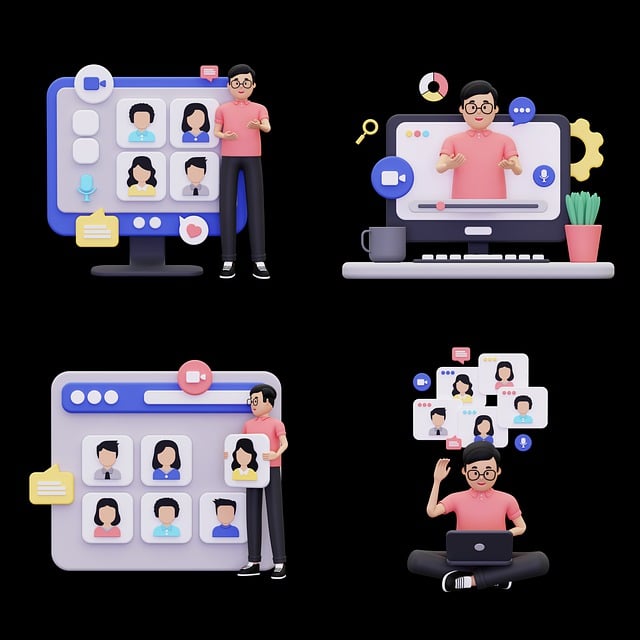Voice search is transforming user interactions with technology, impacting behavior and expectations significantly. For SEO Online Training success, understanding this shift is crucial. Learners explore voice search fundamentals, user interactions, and content optimization for conversational queries. Key skills include identifying long-tail keywords, crafting natural language queries, structuring content to address user intent, and integrating voice SEO with digital marketing campaigns. Through hands-on experience with specialized tools, trainees gain the skills needed to optimize content for top rankings in voice assistant results, outperforming competitors and attracting broader customer bases. Measuring success involves tracking key metrics like ranking positions, click-through rates, and voice search query volumes, while staying ahead requires continuous learning in this fast-paced, evolving digital landscape.
Voice SEO Online Training is an essential resource for businesses aiming to thrive in today’s voice-activated world. With search trends shifting towards voice queries, understanding and optimizing content for virtual assistants becomes crucial. This comprehensive guide covers everything from deciphering user intent behind voice searches to crafting effective keywords.
Learn practical tools for analysis, discover content optimization strategies, and stay ahead of the curve with continuous learning in this dynamic SEO landscape. Invest in our online training to future-proof your business’s online visibility.
Understanding Voice Search and Its Impact on SEO

Voice search is transforming how people interact with technology, driving a significant shift in user behavior and expectations. With virtual assistants like Siri, Alexa, and Google Assistant becoming ubiquitous, more queries are being performed through voice commands rather than typed text. This trend has profound implications for SEO, as traditional keyword research and optimization strategies need to adapt to the new conversational nature of search.
In today’s digital era, understanding voice search is crucial for anyone seeking to excel in SEO Online Training. Unlike text searches, voice queries are often more natural, direct, and task-oriented. Users typically speak in full sentences or phrases rather than typing keywords. This shift necessitates a focus on long-tail keywords and natural language processing within content strategy. By optimizing content to answer the questions users might ask, businesses can improve their visibility and relevance in voice search results.
The Benefits of Voice SEO Online Training for Businesses

Voice SEO online training offers businesses a powerful tool to stay ahead in the digital age. With voice assistants becoming an integral part of daily life, optimizing content for voice search is no longer an option but a necessity. This type of training equips business owners and marketing professionals with the skills to understand and implement effective strategies tailored for voice-activated devices. By learning how to optimize content for natural language queries, businesses can increase their online visibility and reach a wider audience.
The benefits are significant: from improving search rankings to enhancing user experience. Voice SEO training teaches participants to create content that is not only keyword-rich but also highly relevant and useful. This ensures that when customers ask voice assistants about products or services, the business’s information comes up accurately and prominently. In today’s competitive market, this can be a game-changer, helping businesses stand out from their competitors and attract more potential customers.
Key Topics Covered in a Comprehensive Voice SEO Course

In a comprehensive SEO Online Training course designed for voice search optimization, learners can expect to delve into several critical aspects essential for ranking in today’s digital era. The key topics typically include understanding the fundamentals of voice search, exploring how users interact with voice assistants, and mastering the art of optimizing content for conversational queries. Participants will learn strategies for identifying long-tail keywords relevant to voice search patterns, crafting natural language queries that mimic human speech, and structuring content that addresses user intent.
Additionally, the course covers best practices for creating rich snippets and structured data markup, which enhance visibility in voice search results. Learners will also gain insights into evaluating and analyzing competitors’ performance in voice search, enabling them to develop effective strategies for outperforming peers. The curriculum may further extend to topics such as building an engaging voice user interface (VUI) and integrating voice SEO with overall digital marketing campaigns.
Hands-on Practice: Using Tools for Voice SEO Analysis

In the realm of SEO Online Training, hands-on practice is paramount. After grasping the theoretical aspects of voice search optimization, trainees dive into navigating various tools designed for in-depth analysis. These tools empower them to scrutinize keyword performance, understand user intent, and identify trends shaping voice search algorithms.
By leveraging these practical resources, participants gain invaluable experience in optimizing content for voice assistants. They learn to employ strategic keywords, craft natural language queries, and enhance user experiences—all crucial elements for excelling in the competitive landscape of voice SEO.
Optimizing Content for Voice Assistants and Smart Speakers

In today’s digital era, optimizing content for voice assistants and smart speakers is a vital aspect of any comprehensive SEO online training. As voice-activated devices like Alexa, Siri, and Google Assistant become increasingly ubiquitous, understanding how to tailor your content for these platforms is crucial. This involves a shift in focus from traditional text-based optimization to a more conversational and contextually aware approach. In terms of SEO Online Training, learning to create content that naturally incorporates keywords and phrases people use when speaking to their assistants is key.
Voice search queries are often shorter, more casual, and highly specific, focusing on direct questions or commands. For instance, instead of searching for “best coffee shops near me,” a user might ask, “What’s the closest café open late?” Therefore, optimizing content involves identifying these natural language queries and ensuring your website provides accurate, relevant answers. This not only enhances user experience but also signals to search engines that your site is authoritative and useful in voice search results.
Crafting Effective Voice Search Queries and Keywords

In today’s digital era, voice search is rapidly gaining popularity, changing how users interact with online content. For businesses aiming to excel in SEO Online Training, understanding and leveraging voice search queries is crucial. Unlike traditional text-based searches, voice queries are often more conversational and natural language-focused. Crafting effective voice search keywords involves embracing this shift in user behavior and adapting your strategy accordingly.
When optimizing for voice search, consider how users might phrase their questions or commands. Think beyond the single keyword and focus on long-tail keywords that mimic real conversations. For instance, instead of targeting a broad term like “marketing tips,” target more specific queries such as “best digital marketing strategies for small businesses” or “how to create an effective online marketing campaign.” This approach not only improves user experience but also helps in ranking higher for voice search results.
Measuring Success: Evaluating Voice SEO Performance

Measuring success is a vital component of any online training program, and Voice SEO Online Training is no exception. In this dynamic landscape of digital marketing, evaluating performance is crucial to understanding what strategies are resonating with audiences and which areas require improvement. By utilizing advanced analytics tools, participants in our program can track key metrics such as search ranking positions, click-through rates (CTR), and voice search query volumes. These insights enable them to refine their SEO techniques for better visibility on both text and voice-based searches.
The success of Voice SEO strategies is often gauged by increased organic reach and higher user engagement. As voice assistants become increasingly integrated into daily life, optimizing content for voice search has become imperative. Through our comprehensive SEO Online Training, participants learn to create content that not only satisfies traditional text-based algorithms but also aligns with the unique requirements of voice search. This includes mastering the art of natural language processing and understanding user intent behind voice queries.
Staying Ahead: Continuous Learning in the Voice SEO Landscape

In the dynamic realm of voice SEO, staying ahead is paramount. The landscape is ever-evolving, driven by algorithm updates and advancements in natural language processing. Engaging in continuous learning becomes not just beneficial but necessary for digital marketers aiming to master this niche. This involves keeping abreast of industry trends, delving into relevant research, and enrolling in specialized SEO online training programs that cater to the unique demands of voice search optimization.
Such training equips professionals with the latest tools and strategies needed to navigate the complex web of voice user queries and intent. By staying informed and adaptable, marketers can ensure their content remains optimized for both traditional text-based searches and voice-activated assistants. This proactive approach not only keeps them competitive but also positions them as leaders in an increasingly voice-driven digital ecosystem.
